Introduction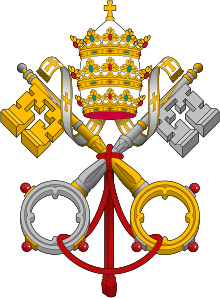 The Catholic Church, also known as the Roman Catholic Church, is the largest Christian church, with 1.39 billion baptized Catholics worldwide as of 2022. It is among the world's oldest and largest international institutions, and has played a prominent role in the history and development of Western civilization. The church consists of 24 sui iuris churches, including the Latin Church and 23 Eastern Catholic Churches, which comprise almost 3,500 dioceses and eparchies located around the world. The pope, who is the bishop of Rome, is the chief pastor of the church. The Diocese of Rome, known as the Holy See, is the central governing authority of the church. The administrative body of the Holy See, the Roman Curia, has its principal offices in Vatican City, a small independent city-state and enclave within the Italian capital city of Rome, of which the pope is head of state. The core beliefs of Catholicism are found in the Nicene Creed. The Catholic Church teaches that it is the one, holy, catholic and apostolic church founded by Jesus Christ in his Great Commission, that its bishops are the successors of Christ's apostles, and that the pope is the successor to Saint Peter, upon whom primacy was conferred by Jesus Christ. It maintains that it practises the original Christian faith taught by the apostles, preserving the faith infallibly through scripture and sacred tradition as authentically interpreted through the magisterium of the church. The Roman Rite and others of the Latin Church, the Eastern Catholic liturgies, and institutes such as mendicant orders, enclosed monastic orders and third orders reflect a variety of theological and spiritual emphases in the church. Of its seven sacraments, the Eucharist is the principal one, celebrated liturgically in the Mass. The church teaches that through consecration by a priest, the sacrificial bread and wine become the body and blood of Christ. The Virgin Mary is venerated as the Perpetual Virgin, Mother of God, and Queen of Heaven; she is honoured in dogmas and devotions. Catholic social teaching emphasizes voluntary support for the sick, the poor, and the afflicted through the corporal and spiritual works of mercy. The Catholic Church operates tens of thousands of Catholic schools, universities and colleges, hospitals, and orphanages around the world, and is the largest non-government provider of education and health care in the world. Among its other social services are numerous charitable and humanitarian organizations. (Full article...) Selected article
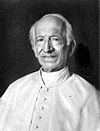 Catholic social teaching comprises those aspects of Catholic doctrine which relate to matters dealing with the collective aspect of humanity. The foundations of modern Catholic social teaching are widely considered to have been laid by Pope Leo XIII's 1891 encyclical letter Rerum Novarum. A distinctive feature of Catholic social teaching is its concern for the poorest members of society. This concern echoes elements of the Jewish law and of the prophetic books of the Old Testament, and recalls the teachings of Jesus Christ recorded in the New Testament, such as his declaration that "whatever you have done for one of these least brothers of Mine, you have done for Me." Another distinctive feature of Catholic social doctrine is the way in which it has consistently critiqued modern social and political ideologies both of the left and of the right: communism, conservatism, socialism, libertarianism, capitalism, liberalism and Nazism have all been condemned, at least in their pure forms, by the Popes at one time or another.
Selected image
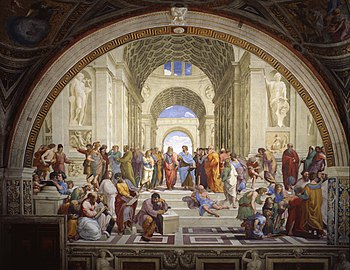 Credit: Raffaello Sanzio The School of Athens or "Scuola di Atene" in Italian is one of the most famous paintings by the Italian Renaissance artist Raphael. It was painted between 1509 and 1510 as a part of Raphael's commission to decorate with frescoes the rooms that are now known as the Stanze di Raffaello, in the Apostolic Palace in the Vatican. Selected biography
Asser (d. 908/909) was a Welsh monk from St. David's, Dyfed, who became Bishop of Sherborne in the 890s. In about 885 he was asked by Alfred the Great to leave St. David's and join the circle of learned men which Alfred was recruiting for his court. After spending a year at Caerwent due to an illness, he accepted. In 893 Asser wrote a biography of Alfred, called the Life of King Alfred. The manuscript survived to modern times in only one copy, which was part of the Cotton library. That copy was destroyed in a fire in 1731, but transcriptions that had been made earlier, allied with material from Asser's work that was included by other early writers, have enabled the work to be reconstructed. The biography is now the main source of information about Alfred's life, and provides far more information about Alfred than is known about any other early English ruler. Asser also assisted Alfred in his translation of Gregory the Great's Pastoral Care, and possibly with other works. Asser is sometimes cited as a source for the legend of Alfred having founded the University of Oxford, which is now known to be false. A short passage making this claim was interpolated by William Camden into his 1603 edition of Asser's Life. Doubts have also been raised periodically about whether the entire Life is a forgery, written by a slightly later writer, but it is now almost universally accepted as genuine.
Did you know...
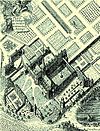
Related portalsFeast Day of June 13
Selected quote

News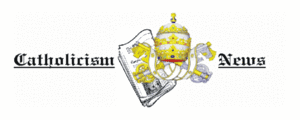
SubcategoriesTopics
The Holy Bible:
Particular Churches (grouped by liturgical rite):
Things you can do
External resourcesWikiProjectsAssociated WikimediaThe following Wikimedia Foundation sister projects provide more on this subject:
Discover Wikipedia using portals |

































